- Home
- Gerald Hammond
Give a Dog a Name (Three Oaks Book 4) Page 4
Give a Dog a Name (Three Oaks Book 4) Read online
Page 4
But Beth was again adamant. She almost dragged me into the big kitchen and forced me into one of the fireside chairs. ‘You can sit down for a mug of soup and a sandwich before you go out into the cold. I’ll tell you about my phone-calls.’
‘It’ll be dark soon,’ I protested.
‘Isobel was out there putting the older dogs through their paces until a shower started. It’s going off now and you’ll still have an hour of daylight. When it’s dark, you can go and teach the novices some basic obedience under the lights in the barn.’ She pushed a mug of scalding soup at me. ‘I know who the pigeon shooter was.’
‘Did Dan Sievewright tell you?’
‘He said he didn’t know, but I’m not sure that I believe him. So I started phoning round the pigeon fanatics. The peak rate was finished,’ she said quickly, ‘and none of the calls lasted for more than a few seconds.’ Beth knows that I have a phobia about running up big phone-bills. ‘Everybody I phoned suggested one or two names and about the fifth name I spoke to turned out to be the right one. Dougal Henshaw,’ she finished triumphantly.
‘The man we met wild-fowling on the Tay?’
‘That’s the one. I had to look him up in the phonebook. His address is Kilcolm Cottage.’
‘What was he doing, at home on a weekday?’ I asked. ‘Is he one of the great unemployed?’
‘He’s working offshore, two weeks on and two off. He said that he was shooting pigeon again yesterday, near Dairsie, until the light went. He was the one on Easter Colm on Saturday and he got five birds, not three, so Mr Buccleugh was wrong, because Mr Henshaw left two of them lying until he picked up his decoys. He says he went straight home afterwards and he didn’t see another spaniel all day. And there was a bird-scarer banging away within earshot, so he doesn’t know whether he heard any shots or not.’
That agreed with what Charles Buccleugh had said. The subject of Dougal Henshaw seemed to be exhausted for the moment. ‘Did Isobel say anything about Horace’s X-rays?’ I asked.
‘She said that they didn’t tell her anything she didn’t already know.’
I had finished my sandwich. My soup had cooled enough to drink. I swallowed it quickly, pulled on my Wellingtons and went out to do some work with Ember in the barn. He had the common but infuriating habit of dropping the dummy just out of reach and although experience rather than training would probably teach him to bring the retrieve right to hand it was not a habit that I wanted to become fixed.
*
Overnight, a shallow depression marched away towards Scandinavia and for once the next was not hard on its heels. The Tuesday came in clear and bright and cold.
I had promised myself that I would forget about the mystery of Horace’s adventures and devote the whole day to the training sessions which accounted for much of our livelihood. And so, of course, I had barely finished breakfast before I heard a car in the drive.
On the off-chance that it might contain a buyer, I hurried outside. Trained dogs are usually sold out by the middle of the shooting season, but one deal had fallen through when the purchaser had been posted abroad. We had several part-trained dogs for sale and young pups were, as always, available or imminent.
But the car at the door was two-tone, blue and white; and a uniformed constable, a stranger, was getting out of it. The faint hope that he might be snatching a few minutes off duty to shop for a puppy died before he had spoken a dozen words.
‘Captain Cunningham?’
‘Mister will do,’ I said. ‘And you are?’
He nodded. ‘Peel,’ he said. He had a ready smile. ‘I’m from Cupar. PC Peel the peeler. Now that we’ve got that out of the way, you may be able to help me. We’ve had a complaint about cruelty to a dog. Near Kilcolm it is.’ There was a trace of Belfast in his accent. ‘The SSPCA man says that he’s seen nothing like it.’
I could believe that. Alex Hautry of the SSPCA had a way with animals and he would be good some day, but he was a city boy and also very new to the job.
‘Not shot, by any chance?’ I asked.
‘You’d better see for yourself. Mr Hautry suggested that it would give us a start if you could tell us what breed it had been.’
This sounded messy. I could do without looking at long-dead dogs on a busy morning. On the other hand, I had intended to take Sunbeam for some work on the rabbits at Easter Colm. A young dog soon learns the difference between training and real work, and a reminder that discipline still holds in the field is no bad thing shortly before a serious competition. It would be a chance to probe a little further into the matter of sheep-worrying.
‘I know where Kilcolm is,’ I said, ‘but I’ll follow you if you’ll give me a minute.’
I fetched Sunbeam and put her in the back of the car. She knew what that meant and her tail was going already. When I fetched a bagged shotgun and a belt of cartridges, the constable’s eyebrows went up but he made no comment. I followed him to Kilcolm. He pulled up in the mouth of a track which ran through the wedge of trees behind the house and I parked behind him. He watched as I slung the bagged gun over my shoulder and locked up.
‘I’ll keep this with me,’ I said. ‘Estate cars don’t lend themselves to hiding things like guns from the passing thief.’ A small string of traffic following a tractor lent point to the remark.
He nodded. ‘I should warn you that it’s not a pretty sight,’ he said.
‘I expect that I’ve seen worse.’
The smile came again. ‘Probably so.’
He led me along the track, leaving Sunbeam yipping in frustration at being left in the car while the gun was taken for a walk. PC Peel was young, quite tall enough for the police minimum height but very thin and wiry.
‘Have you had any complaints about sheep-worrying lately?’ I asked him as we walked.
‘Not that I’ve heard. There was a complaint two or three weeks ago – a Labrador led into mischief by a collie. But that was down near Kirkcaldy. The owners have been warned.’
‘And no reports of dogs coming home with shotgun pellets in them?’
‘No.’ He was much less curious than our local man.
We turned off and followed a narrow path through dead bracken. I had already guessed what we would find. The tabloids have a shock-horror story about such things every year or two, so the vulpine corpse hanging from the limb of a tree, indecent in its nudity, came as no surprise to me.
‘It seems to have been strangled,’ the constable said.
‘I’d be interested to know who found it,’ I said. Arthur Lansdyke was still abroad and his spaniel in our care, so who was walking in his woods?
‘A local woman, gathering fir-cones for the fire. She’s in quite a tizzy, very upset that anyone could do such a thing to a dog.’
‘You’d better go and set her mind at rest,’ I said. ‘They didn’t. I’ll probably be speaking to Mr Lansdyke on the phone within the next day or two. If you really want to follow it up, I can ask him whether anybody has permission to take foxes here.’
He almost gaped at me. ‘This is a fox?’
‘Yes.’
‘I’d never have known. What killed it? I do a bit of shooting myself – just the clay pigeons – so shot was the first thing I looked for.’
‘It was snared,’ I said. ‘Somebody hung it up to skin it for the pelt and then was too lazy to cut it down and bury it, or even stuff it down a rabbit hole. Or else he had no business being here and he heard somebody coming. I’ll deal with it if you like. Or do you want it for evidence?’
Peel made a grimace. ‘Evidence of what? They’ll not thank me if I fetch it in to the station. You deal with it, sir, and I’ll be grateful.’
I usually have a spade with me, more for digging the car out of mud or snow than for burying the dead. I walked back with PC Peel to fetch it.
Half an hour later, we were on Easter Colm. When we reached the trees where the hedges met I remembered to give Charles Buccleugh a wave, but I had no way of knowing whether he had seen it o
r not.
Chapter Four
That weekend at Dairy, Sunbeam was entered for the spaniel puppy stake on the Friday, which was to be followed next day by a retriever stake in which Beth had entered Jason, her personal Labrador. Jason lived with the other dogs in the kennels but Beth’s work with him was entirely on her own account. Whenever I suggested that she was competent to represent the firm by handling one of our spaniels in a trial, she turned white and showed all the signs of imminent nervous breakdown, yet she and Jason made a formidable team in retriever events and it would be only a matter of time before awards would come their way.
So Isobel moved into the farmhouse on the Thursday evening, leaving husband Henry to fend for himself – which he usually managed to do in great comfort. Beth could sense that I was tired, so she drove my big estate car through to Dalry while I dozed beside her and the two dogs curled up together in the back, raising their heads only when the car slowed and showed signs of coming to a halt.
The dogs, as usual, had their beds in the car but we slept that night in a plushy but cold bedroom in a big hotel and went to the novice stake in good time – for my part with the usual butterflies in the stomach.
Isobel might have a better temperament for competition handling than I have but it was true, as she had said, that Sunbeam worked better for me. Even so, Isobel would probably have fared better than I did.
Second time ‘down’, Sunbeam put up a cock pheasant from the edge of a turnip field. The nearer gun missed it clean and the other shot hastily. The bird spiralled down, a strong runner, and legged it into a large area of reeds. The judge nodded to me and I sent Sunbeam for it. She headed confidently into the reeds. Too soon, I decided that she was off the line and I gave her the stop whistle. She rose on her hind legs to see me over the reeds and I gave her a signal to push her over towards where I thought the bird would be heading. She failed on the retrieve and had her eye wiped. Beth, who was back with the spectators but was watching from a higher viewpoint, said afterwards that Sunbeam was on the line of the runner and given half a minute more would have collected it.
We were unplaced.
On the next day; I was again nervous, at least as nervous as Beth and probably more so. She handled Jason with apparent calm and Jason responded with a performance which, as far as I could see from among the spectators, was faultless. At one point the two judges, one of whom I saw was Aubrey Stoneham, came together to examine one of Jason’s retrieves. Surely, I thought, he was not going to be put out for biting down on the retrieve? Not Jason, who had one of the softest mouths I had ever encountered? Often, in the spring, he would bring one of us, quite unharmed, a newly hatched songbird chick which had fallen out of its nest. Replaced in the nest, it would usually thrive.
There was an argument between the judges and one or two glances seemed to be aimed not at Beth but in my direction. Then they came to a decision and the line moved on. Evidently, all was well.
When the trial finished, I was sure that Beth and Jason had to have won. Every other dog had shown some fault, however slight, while Jason had had some of the most difficult retrieves and had never missed a trick. But no trial is over until the judges have given their verdict.
There was a long wait in a draughty farmyard while the judges argued again. At last, they pronounced. Beth and Jason were placed third. First place went to a dog that had several times shown signs of impatience and had only been checked from running-in by a quick word from the handler.
Beth was elated by her placing, her best yet; but I knew that her dream was to make Jason up to champion status, and only a win would have counted towards that goal. Luck of the draw, I told myself. Judges can make mistakes but they as often err in one’s favour as the other way.
We went back to the hotel, fed the dogs and bedded them in the back of the car and then settled ourselves at a small table in the corner of the bar while we waited for dinner to be served. Beth insisted on buying me a pint out of her modest prize money. The room filled with competitors and followers, celebrating or consoling, and began to empty again as those within, reach of home trickled away.
Out of the corner of my eye I had been aware of a figure moving closer as the throng eddied. Suddenly a voice said, ‘Mind if I join you?’ in a tone suggesting that any objection would be irrelevant if not downright impossible.
I looked up. The tall figure of Aubrey Stoneham was looming over us.
If Stoneham had ever been one of my favourite people, this was not the day; but common courtesy required that I get up and pull over a chair for him.
He sat down with a grunt. ‘Hard on the feet, a day’s judging,’ he said. ‘Sometimes I think that the Americans have the right idea. I was at a trial over there where the judges were on horseback. Saves their poor old legs and they get a better view from higher up. Viewpoints can be very important.’ He paused and looked at me. He had a highly coloured face with a slightly twisted mouth. He also had a habit of looking at me, down a proud nose, as though I had been a dog which had just peed on its retrieve. There seemed to be a colder than usual gleam in his eye. ‘Hard luck on your wife, I thought. For a while, she seemed to have it in the bag.’
I make it a rule never to argue with a judge. He won’t change his ruling post hoc, and he might be even more severe next time around. ‘I thought that she did well,’ I said.
‘Thank you, dear,’ Beth said. She was looking from one to the other of us, sensing undercurrents. I was as puzzled. Aubrey Stoneham did not usually mingle with those he regarded as hoi polloi. He was working up to something.
‘I thought she did very well. Of course, the competition was strong. Sometimes, doing very well isn’t enough,’ Stoneham said slowly. ‘You don’t seem to be in very good odour just now. It shouldn’t affect the outcome of a trial, but it can do. Judgement between good performances is very subjective, after all.’
A cold hand played scales up and down my back. I thought that I might prefer not to hear any more.
‘What do you mean?’ Beth asked.
He never took his eyes off me. ‘You seem to be making waves on the subject of Lansdyke’s wretched dog,’ he said. ‘And then there’s this cruelty thing hanging over you.’
I must have gaped at him like an idiot. My mind refused to find any rational connection. Again, it was Beth who spoke. ‘What cruelty thing?’
He glanced at her for the first time. ‘Come on, now,’ he said. ‘You must know.’ I was almost convinced that he believed what he was saying.
‘No,’ Beth said. ‘We don’t.’
‘You weren’t aware that a complaint against you is being considered, for unnecessarily brutal treatment of the dogs in your care?’
‘That’s rubbish,’ I said. It had to be. I may give a young dog, at most, one good shake on the first occasion when it decides that the order to ‘come’ may be disobeyed with impunity. After that, my two guiding principles in training are that a dog should never be tempted to learn the wrong habits and thereafter should be praised for success rather than blamed for failure. I even have to warn a purchaser that punishment may be counter-productive because it may be outside the dog’s previous experience.
Stoneham sighed rather theatrically and delved in the pockets of his Goretex coat. He brought out an orange envelope of the kind in which photographic prints are supplied. ‘These have only just reached me and I shall want them all back. Before you waste your breath and my time in denials, you’d better look through them.’
There were about ten photographs in the envelope. I glanced at each one before passing it to Beth although after the first two or three my mind refused to accept the evidence of my eyes. Each purported to show me beating a spaniel. I tend to recognise dogs by their mannerisms rather than by their markings, but even so I thought that I could recognise the bitch in the pictures and the place where the impossible acts had occurred. I was too numbed with shock to take in any other details.
Beth spent longer studying the prints. She handed them b
ack to Stoneham. ‘They’re fakes, of course,’ she said.
‘You’re going to tell me that you’ve never seen your husband, a professional trainer, raise his hand to a dog?’
‘I’ve seen him raise his hand often enough. But only as a warning. I’ve never seen him bring it down.’
Stoneham dropped the envelope of prints into his pocket and got to his feet. ‘Believe what you want to believe,’ he said. ‘But I think that you should keep a very low profile for a good long while, both of you.’ He nodded and turned away.
Beth was out of her chair before I could stop her. She caught Stoneham by the sleeve. ‘Did you shoot Horace?’ she demanded.
‘Who?’
‘Mr Lansdyke’s springer.’
I had got to my feet but I lowered myself into the chair again. It was too late to interfere. People were staring and, if I joined in, I could only make the argument escalate.
Aubrey Stoneham’s high colour became more florid even than usual. ‘Certainly not,’ he said. ‘How dare you, young woman? If you’re in any doubt, watch the reports in Gundog World. A week ago today, wasn’t it? I was judging at a retriever stake in the Borders that day. Good evening to you.’
He swung away again and I saw him go out through the hall. Beth came back to our table. ‘Go and cancel our room and pay the bill while I pack,’ she said. ‘We’re going home.’
*
Army life had inured me against emotional shocks but my long illness had lowered my resistance. Perhaps something within me had tried to provide a substitute for that mental fortitude by granting me the gift of sleep in crises. Whatever the cause, sudden worry is followed immediately by all the symptoms of exhaustion. I drove for the first few miles, but as soon as she saw me yawn Beth made me pull into a lay-by while she took over the wheel.
Perhaps I dozed for a while. I certainly have no recollection of the journey between Glasgow and Kinross. Then, quite suddenly, I was alert again.

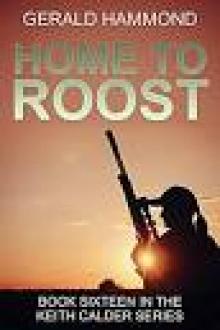 Home to Roost
Home to Roost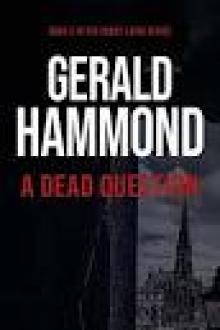 A Dead Question
A Dead Question Twice Bitten
Twice Bitten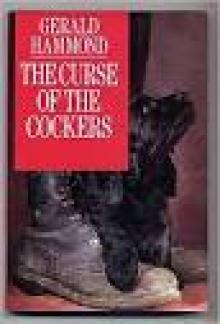 The Curse of the Cockers
The Curse of the Cockers In Loving Memory
In Loving Memory Illegal Tender (Three Oaks Book 12)
Illegal Tender (Three Oaks Book 12) Cold Relations (Honey Laird Book 1)
Cold Relations (Honey Laird Book 1)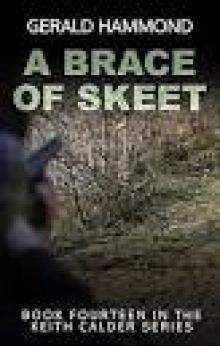 A Brace of Skeet
A Brace of Skeet Silver City Scandal
Silver City Scandal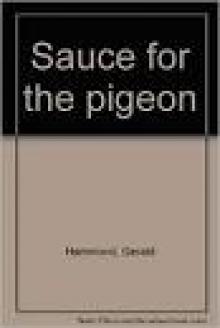 Sauce For the Pigeon
Sauce For the Pigeon Cold Relations
Cold Relations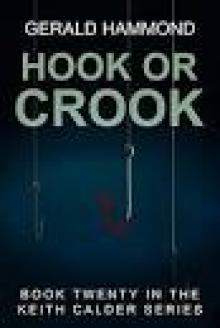 Hook or Crook
Hook or Crook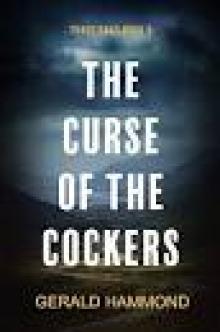 The Curse of the Cockers (Three Oaks Book 5)
The Curse of the Cockers (Three Oaks Book 5)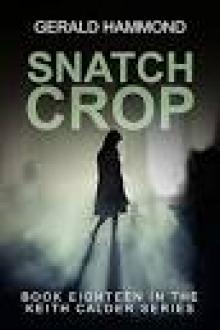 Snatch Crop
Snatch Crop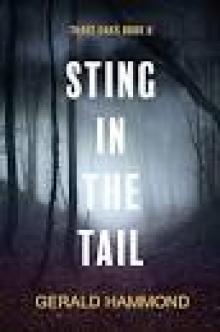 Sting in the Tail (Three Oaks Book 6)
Sting in the Tail (Three Oaks Book 6)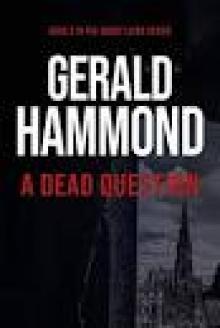 A Dead Question (Honey Laird Book 2)
A Dead Question (Honey Laird Book 2)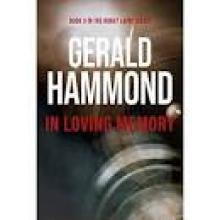 In Loving Memory (Honey Laird Book 3)
In Loving Memory (Honey Laird Book 3) Thin Air
Thin Air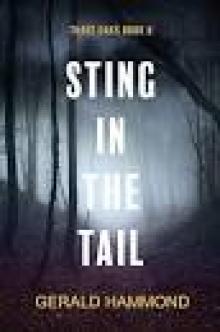 Sting in the Tail
Sting in the Tail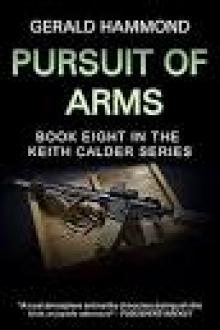 Pursuit of Arms
Pursuit of Arms The Game
The Game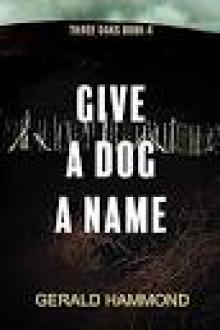 Give a Dog a Name (Three Oaks Book 4)
Give a Dog a Name (Three Oaks Book 4) Fair Game
Fair Game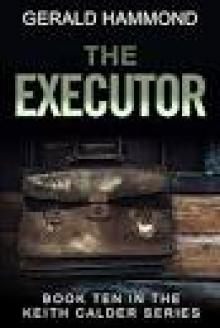 The Executor (Keith Calder Book 10)
The Executor (Keith Calder Book 10)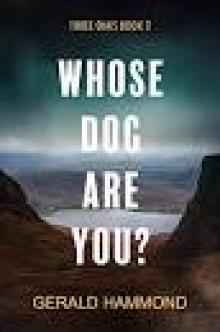 Whose Dog Are You? (Three Oaks Book 2)
Whose Dog Are You? (Three Oaks Book 2)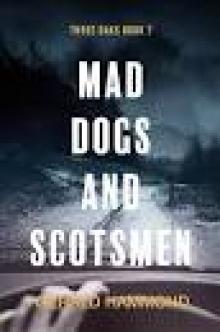 Mad Dogs and Scotsmen (Three Oaks Book 7)
Mad Dogs and Scotsmen (Three Oaks Book 7) Cousin Once Removed
Cousin Once Removed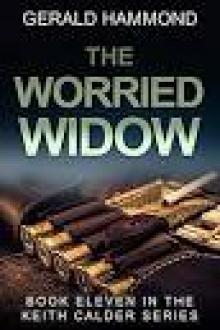 The Worried Widow
The Worried Widow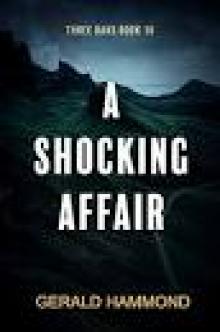 A Shocking Affair
A Shocking Affair Dead Weight (Three Oaks Book 11)
Dead Weight (Three Oaks Book 11)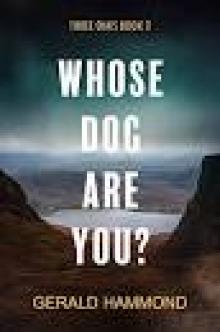 Whose Dog Are You
Whose Dog Are You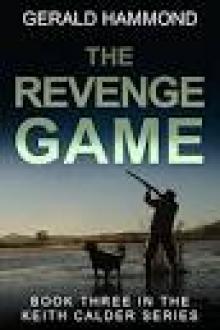 The Revenge Game
The Revenge Game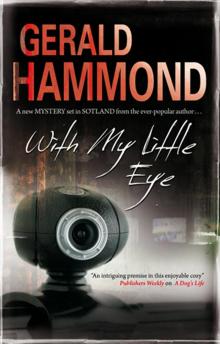 With My Little Eye
With My Little Eye Doghouse (Three Oaks Book 3)
Doghouse (Three Oaks Book 3)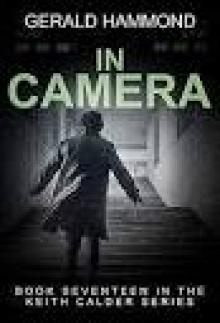 In Camera
In Camera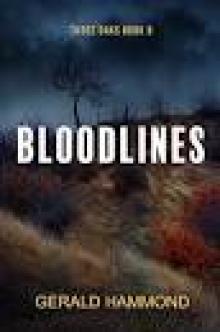 Bloodlines (Three Oaks Book 8)
Bloodlines (Three Oaks Book 8)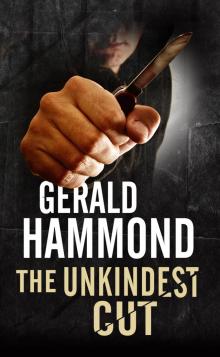 The Unkindest Cut
The Unkindest Cut